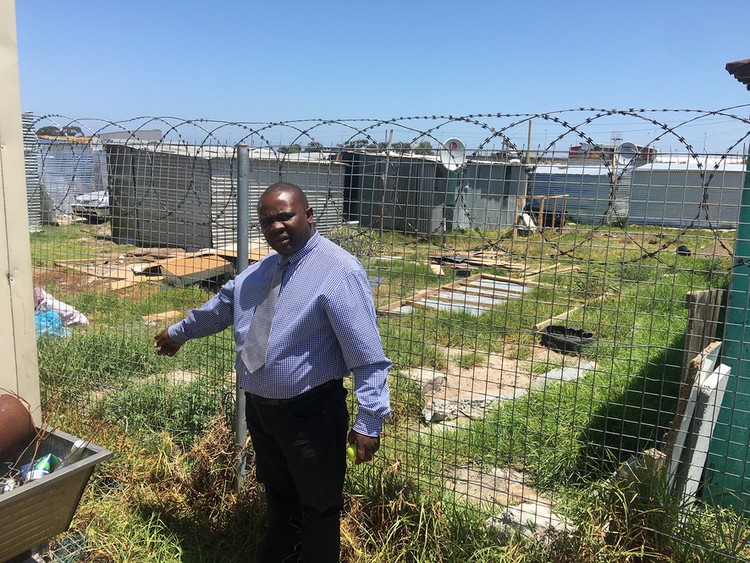
Sophakama Primary School principal Sabelo Makhubalo points to where the school’s water supply has been tapped. Photo: Peter Luhanga
28 January 2019
Sophakama Primary School in Dunoon is facing a bill of close to half a million rand after people who occupied a municipal sports field at the back of the school tapped into the school’s water supply.
The invoice is for R444,827.20 and was due to be paid on 20 November.
People began occupying the sports field in March 2017. They were previously living in backyards in the Dunoon area. Many could no longer afford to pay rent while some were evicted after owners sold the houses.
Desperate for accommodation, they started occupying the only available open space, the municipal sports field. At the height of this, the residents had running battles with the city’s Anti Land Invasion Unit (ALIU) and the police.
Each time the ALIU demolished the structures and confiscated building materials, the residents returned the same day and rebuilt. This went on for three months and they eventually succeeded in settling on the land in June.
But they had no municipal services, including water.
The sports field contains irrigation pipes, which some residents tapped into. Others got water from the primary school.
School principal Sabelo Makhubalo said he was shocked to discover the massive water bill. He says the school’s water bill usually averaged R20,000 to R25,000 per month. “I went to the City to report the matter and I also reported it to the Western Cape Education Department and the local ward councillor,” said Makhubalo.
He fears the City might disconnect the school’s water supply.
“We don’t have that kind of money in our school budget. How are we going to pay that water bill?”
Bronagh Hammond, spokesperson for the Western Cape Education Department (WCED), said the department was aware of the spike in the municipal account at Sophakama Primary. She said the WCED’s infrastructure directorate had been alerted and there might be ways the school could restrict consumption by the community on the sports field.
She said the department monitored municipal bills “and we engage with the City on the bill. In some instances, we assist with settling the bill. We will need to investigate the causes and will assist where we can,” said Hammond.
Ward 104 councillor Lubabalo Makeleni (ANC) said the City had planned to build a sports facility at the sports field before it was occupied. The budget was R16.5m. After the occupation, the project fell away, he said.
He said he now wanted the City to provide services to the residents, to avoid the problems the school is experiencing.
He said residents had also tapped water from neighbouring houses, as well as electricity directly from Eskom’s power lines.
“There is no refuse collection, no water, no electricity. The need for these services is creating friction among the residents surrounding the informal settlement called Ekupholeni. I am now working on a solution to ensure that there is peace and stability,” said Makeleni.
Councillor Malusi Booi, the City’s Mayoral Committee Member for Human Settlements, said the City could not prioritise basic services in informal settlements “which have more recently been established through large-scale land invasions”.
“This cannot happen at the expense of residents in other areas where service provision has been earmarked as part of the City’s budgeted programmes,” said Booi.
He said that the City understood the great need for accommodation, but would continue to prevent land occupations, so as to prevent new unplanned settlements jeopardising existing settlement programmes and services that had already been planned and budgeted for.
“Invaded land also carries health and safety risks. The illegal connection of services is absolutely condemned as this places communities at extreme risk, and not just those who are illegally connecting to services,” he said.
Jyothi Naidoo, City’s spokesperson, said the City’s water service team was investigating the high water bill.
A resident who occupied the land said all the residents wanted was vacant land to build their homes. Everything else they would supply for themselves. Thobela Nkone, who used to live in a backyard, said: “We can’t wait for the City to provide us services. We wanted land, we got it. If they can’t give us services we will make plans and cater for ourselves,” said Nkone.
But another resident, Yanga Nkohla, said, “We are sorry for the school but we have no choice. We are in dire need of basic municipal services.”